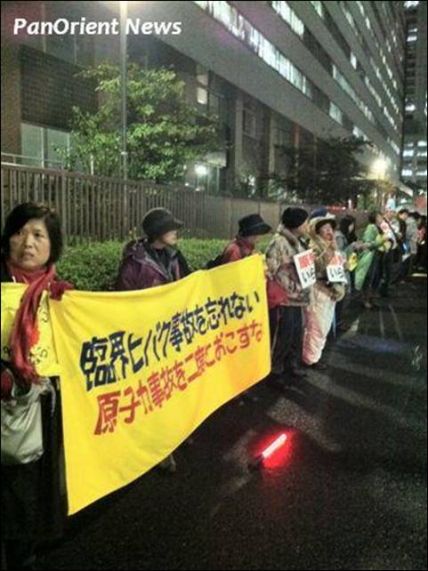|
Environment
Fukushima Women Form Chain in Tokyo Demanding Protection of Children
Sunday, November 13, 2011

Tokyo- (PanOrient News) About 1300 Japanese women made a human chain Friday night around the building of Ministry of Economy, Trade and Industry (METI) in Tokyo demanding protection from the nuclear disaster fallout and calling on the Japanese government to close nuclear stations, activisits said.
Most of them came from the Fukushima prefecture that was hit by the worst nuclear disaster after an earthquake and tsunami caused a nuclear meltdown and leakage of radioactive material at the Fukushima plant on March 11.
Many women from Fukushima temporarily living with families in Tokyo have expressed frustration that no solution to their plight has been reached by the Japanese government. Some of the women have been participating in a sit-in protest in tents on the sidewalk of METI Building in central Tokyo.
On October 29, after a three-day sit-in outside the Ministry of Economy, Trade and Industry, more than 8oo women marched down the streets of Tokyo in protest of the failure of the Japanese government to evacuate children at risk. The marchers have expressed fear for the safety of the children in the areas contaminated by the nuclear meltdown in Fukushima.
According to a survey conducted in September by Fukushima University, more than one quarter of evacuees from the stricken areas around the Fukushima Plant, do not wish to return to their original residences. Of that number, more than half were under 34. The reasons given were said to be distrust and uncertainty regarding the government’s plans to clear the area of radiation leakage.
Another survey by the Mainichi Shimbun found that although temporary housing for evacuees in the prefectures of Fukushima and Iwate would be adequate for the cold winter ahead that of Miyagi prefecture, which has the greatest number of evacuated households lacked sufficient heating equipment.
The government has reportedly lowered the acceptable radiation standard for the prefecture in order to minimize government grants. Action groups say that families cannot afford to leave without financial support and jobs are scarce throughout Japan. Many families say they feel trapped in a situation where small children and pregnant women are especially vulnerable. Other families are living separately as wives and children move to other areas and the husbands stay behind to work.
The sit-in and march seems to be a radical move by Japanese women where more and more voices are demanding that all nuclear power plants in Japan be closed.
PanOrient News
© PanOrient News All Rights Reserved.
|

